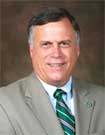
|
 |
Is it Time for
McGuffey to Return to the Public Classroom?
By Steve Gruber, Ph.D., Chair, Education Department
Cedarville University
During much of the 19th and early 20th centuries the textbooks of
William H. McGuffey provided young students with their introduction to
the joy of reading. McGuffey discovered that he could improve reading
skills in his students by making reading more fun. The McGuffey Readers
were comprised of poems, essays, speeches, and short stories which
emphasized a positive outlook on life. During the 19th century the
Readers were one of the most read books with over 120 million copies
being sold.
Beyond their value in teaching reading skills the Readers inculcated
into the minds of young readers values such as honesty, truthfulness,
obedience, kindness, thrift, industry, patriotism, and piety. Many of
the essays and short stories referenced quotations from the Bible and
classic scholars. Unfortunately today, much of what was contained in
McGuffey’s Readers would be considered politically incorrect or in
direct violation of the doctrine of “separation of church and state”.
Therefore, educators in public schools would not be encouraged to use
the Readers as part of their classroom curriculum.
Has our aversion to all things religious placed public education in a
moral vacuum? Can there truly be a character education curriculum
without moral authority?
Certainly the classroom of the 21st century is vastly different from
those of the 19th. No one would suggest that we abandon the current
classroom technology in order to return to kerosene lamps, chalkboards,
and wood stoves. Teaching skills that are relevant to the world in
which students live is just as important today as yesterday. However, I
would challenge the teachers of today to pick up a copy of McGuffey’s
Fifth Reader and see for themselves the erosion in reading and
vocabulary skills. Most adults of today would struggle with the reading
selections once read by elementary students of the 19th century.
In addition to discovering the erosion of reading skills, today’s
adults would also be confronted with the societal slide in civility,
ethics, and morality that is now impacting many of our public schools.
Perhaps it is time to once again invite McGuffey back into our public
school classrooms. The following is an excerpt from McGuffey’s
Fifth Reader pages 284-286 and was written by William Ellery Channing.
“Religion is a social concern; for it operates powerfully on society,
contributing in various ways to its stability and prosperity. Religion
is not merely a private affair; the community is deeply interested in
its diffusion; for it is the best support of the virtues and
principles, on which the social order rests. Pure and undefiled
religion is to do good; and it follows, very plainly, that if God be
the Author and Friend of society, then, the recognition of him must
enforce all social duty, and enlightened Piety must give its whole
strength to public order.
“Few men suspect, perhaps not man comprehends, the extent of the
support given by religion to every virtue. No man, perhaps, is aware
how much our moral and social sentiments are fed from this fountain;
how powerless conscience would become without the belief of a God; how
palsied would be human benevolence, were there not the sense of a
higher benevolence to quicken and sustain it; how suddenly the whole of
social fabric would quake, and with what a fearful crash it would sink
into hopeless ruin, were the ideas of a Supreme Being, of
accountableness and of a future life to be utterly erased from every
mind.
“Erase all thought and fear of God from a community, and selfishness
and sensuality would absorb the whole man. Appetite, knowing no
restraint, and suffering, having no solace or hope, would trample in
scorn on the restraints of human laws. Virtue, duty, principle, would
be mocked and spurned as unmeaning sounds. A sordid self-interest would
supplant every feeling; and man would become, in fact, what the theory
in atheism declares him to be, - - a companion for brutes.”
Both in content and academic rigor it is clear from this 5th reader
passage that we have come a long way since the days of
McGuffey---forward or backward, you decide?
Dr. Gruber is a graduate
of, and teacher and principal at, Greenville High School.
|
|
|
|

